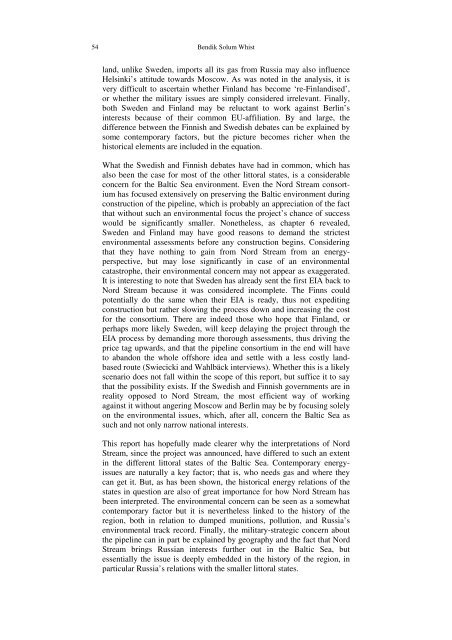Nord Stream: Not Just a Pipeline
Nord Stream: Not Just a Pipeline
Nord Stream: Not Just a Pipeline
Create successful ePaper yourself
Turn your PDF publications into a flip-book with our unique Google optimized e-Paper software.
54 Bendik Solum Whist<br />
land, unlike Sweden, imports all its gas from Russia may also influence<br />
Helsinki’s attitude towards Moscow. As was noted in the analysis, it is<br />
very difficult to ascertain whether Finland has become ‘re-Finlandised’,<br />
or whether the military issues are simply considered irrelevant. Finally,<br />
both Sweden and Finland may be reluctant to work against Berlin’s<br />
interests because of their common EU-affiliation. By and large, the<br />
difference between the Finnish and Swedish debates can be explained by<br />
some contemporary factors, but the picture becomes richer when the<br />
historical elements are included in the equation.<br />
What the Swedish and Finnish debates have had in common, which has<br />
also been the case for most of the other littoral states, is a considerable<br />
concern for the Baltic Sea environment. Even the <strong>Nord</strong> <strong>Stream</strong> consortium<br />
has focused extensively on preserving the Baltic environment during<br />
construction of the pipeline, which is probably an appreciation of the fact<br />
that without such an environmental focus the project’s chance of success<br />
would be significantly smaller. Nonetheless, as chapter 6 revealed,<br />
Sweden and Finland may have good reasons to demand the strictest<br />
environmental assessments before any construction begins. Considering<br />
that they have nothing to gain from <strong>Nord</strong> <strong>Stream</strong> from an energyperspective,<br />
but may lose significantly in case of an environmental<br />
catastrophe, their environmental concern may not appear as exaggerated.<br />
It is interesting to note that Sweden has already sent the first EIA back to<br />
<strong>Nord</strong> <strong>Stream</strong> because it was considered incomplete. The Finns could<br />
potentially do the same when their EIA is ready, thus not expediting<br />
construction but rather slowing the process down and increasing the cost<br />
for the consortium. There are indeed those who hope that Finland, or<br />
perhaps more likely Sweden, will keep delaying the project through the<br />
EIA process by demanding more thorough assessments, thus driving the<br />
price tag upwards, and that the pipeline consortium in the end will have<br />
to abandon the whole offshore idea and settle with a less costly landbased<br />
route (Swiecicki and Wahlbäck interviews). Whether this is a likely<br />
scenario does not fall within the scope of this report, but suffice it to say<br />
that the possibility exists. If the Swedish and Finnish governments are in<br />
reality opposed to <strong>Nord</strong> <strong>Stream</strong>, the most efficient way of working<br />
against it without angering Moscow and Berlin may be by focusing solely<br />
on the environmental issues, which, after all, concern the Baltic Sea as<br />
such and not only narrow national interests.<br />
This report has hopefully made clearer why the interpretations of <strong>Nord</strong><br />
<strong>Stream</strong>, since the project was announced, have differed to such an extent<br />
in the different littoral states of the Baltic Sea. Contemporary energyissues<br />
are naturally a key factor; that is, who needs gas and where they<br />
can get it. But, as has been shown, the historical energy relations of the<br />
states in question are also of great importance for how <strong>Nord</strong> <strong>Stream</strong> has<br />
been interpreted. The environmental concern can be seen as a somewhat<br />
contemporary factor but it is nevertheless linked to the history of the<br />
region, both in relation to dumped munitions, pollution, and Russia’s<br />
environmental track record. Finally, the military-strategic concern about<br />
the pipeline can in part be explained by geography and the fact that <strong>Nord</strong><br />
<strong>Stream</strong> brings Russian interests further out in the Baltic Sea, but<br />
essentially the issue is deeply embedded in the history of the region, in<br />
particular Russia’s relations with the smaller littoral states.













